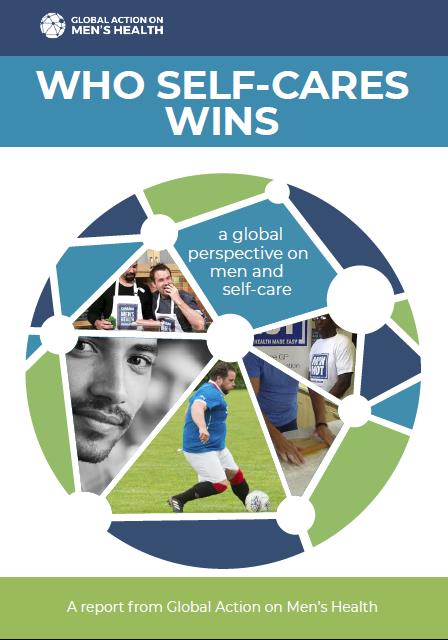Who Self-Care Wins
Who Self-Cares Wins: A global perspective on men and self-care, GAMH’s latest report, is published today (5 April) to coincide with World Health Day on 7 April.
The report demonstrates that the commonly-held idea that men are invariably self-destructive when it comes to their health is not true – globally, most men do enough physical activity to benefit their health and do not smoke or drink alcohol – but it also very clearly shows that men’s health is unnecessarily poor. Average global life expectancy for men lags behind women’s by four years (70 v 74 years) and there is not a single country where men live longer than women. Around half of the sex difference in mortality from all causes in Europe is due to smoking and around one fifth is due to alcohol consumption. Globally, about 45% of male deaths are due to health behaviours, according to the Institute for Health Metrics and Evaluation. Improving men’s self-care could therefore lead to major improvements in their health.
Who Self-Cares Wins shows that male gender norms are a key barrier to better self-care for men with men who most closely identify with ‘traditional’ masculinity most likely to exhibit damaging lifestyle behaviours. But health policies and services have not taken men into account. Only three countries have specific national men’s health policies (Australia, Brazil and Ireland). Most global health organisations do not address men’s health either. The report argues that while it is clearly the responsibility of individual men to take care of their own health, strategies to improve men’s health cannot simply be based on exhortations to change lifestyle practices that are rooted in gender norms and other social determinants of health. Who Self-Cares Wins argues that action on a multi-layered and systems-wide basis is needed to improve men’s self-care effectively.
The report’s recommendations include the introduction of health policies, including national men’s health policies, that recognise the needs of men; that full account is taken of male gender norms in policy and service delivery; the establishment of self-care as a strategic priority in public health policy and practice; action to improve men’s health literacy; the development of health services that are more accessible to men; better training in men’s health for health and related professionals; and accelerated research into improving men’s engagement in self-care and better practical guidance for policymakers and practitioners.
The report’s author and GAMH Director, Peter Baker, said: ‘It is indisputable and unacceptable that men’s health is unnecessarily poor in every country in the world. This is in large part due to male gender norms, which lead many men to take risks with their health, and the failure of policymakers and service providers at all levels to take account of men’s specific needs, attitudes and behaviours. That’s why, on World Health Day, we are calling on global and national health leaders to introduce the policies and services that would make a difference.’
Dr David Webber, President of the International Self-Care Foundation, said: ‘In the self-care field as elsewhere, men’s health has been generally overlooked. This report provides a very welcome synthesis of the key issues and clearly shows that there is now enough evidence from research and examples of good practice to make the changes that are needed. Measures to improve men’s self-care should be an essential part of the effort to improve overall health outcomes.’
‘Many congratulations to Global Action on Men’s Health for their report on men and self-care. I’m really impressed by its breadth and depth. It’s a great compilation of the evidence around men’s attitudes and practices, as well as practical advice’ – Sarah Hawkes, Professor of Global Public Health and Director, UCL Centre for Gender and Global Health and Co-Director, Global Health 50/50.
23 April 2019


